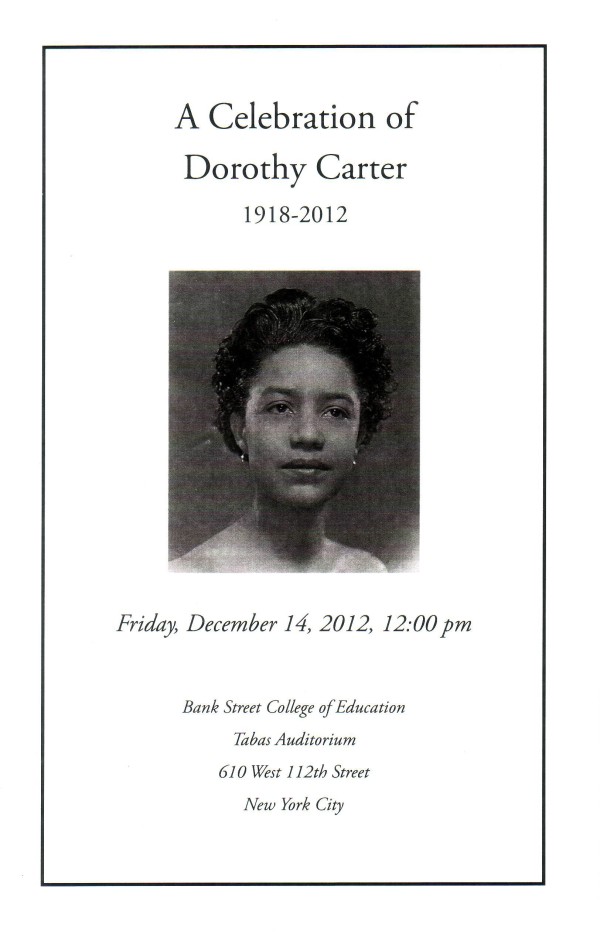Remembering Dorothy Carter
 A celebration of the life and contributions of Dorothy Carter was held in Tabas Auditorium at Bank Street College of Education on Friday, December 14, 2012. Poetry, prayer and song wrapped around the reflections of the celebrants, as they brought to life an extraordinary woman who was in love with the theater, the written word, and the child in everyone.
A celebration of the life and contributions of Dorothy Carter was held in Tabas Auditorium at Bank Street College of Education on Friday, December 14, 2012. Poetry, prayer and song wrapped around the reflections of the celebrants, as they brought to life an extraordinary woman who was in love with the theater, the written word, and the child in everyone.
Dorothy Carter was one of the first African-American Graduate Faculty members at Bank Street, and the first recipient of the Lucy Sprague Mitchell Award in 2006. For the past eight years, she chaired the Bank Street Writers Lab. She died on September 14, 2012, at the age of 94. Elizabeth Jakab, with whom Dorothy chaired the Writers Lab, served as M.C.
Nancy Ledger, fellow actress in the Morningside Players where Ms. Carter directed a number of plays, recited “Mother to Son” by Langston Hughes. Its closing lines suggest the legacy Ms. Carter leaves behind, to her students, family, friends, and colleagues:
Don’t you fall now—
For I’se still goin’, honey,
I’se still climbin’,
And life for me ain’t been no crystal stair.
As Dorothy Carter’s daughter, Carol Carter, put it, “She fell in love with the theater and it loved her back.” Dorothy Carter played Bess Anderson in the 1945 Broadway production of Lillian Smith’s “Strange Fruit,” directed by José Ferrer. She also starred in “Walk Hard” in 1946, and in Louis Peterson’s “Take a Giant Step” (1953), which co-starred Jane White and Louis Gossett, Jr. She studied theater at Spelman College in Atlanta, and received a Rosenwald Fellowship to The New School’s Dramatic Workshop, where she studied with Stella Adler. Lydia La Fleur, co-founder of Morningside Players, where Carter directed a number of plays, said, “Dorothy was not afraid of Chekov, Ibsen, or Tennessee Williams.” The last play Ms. Carter directed there was “The Cherry Orchard” in 2007, and last spring, she got to see her daughter, Carol Carter, perform in “Raisin in the Sun.”
As Bank Street graduate faculty member Salvatore (“Sal”) Vascellaro put it, “I’d listen to Dorothy Carter even if she were reading her shopping list.” He invited her back to his class each year. Elizabeth Jakab, standing in for Ms. Carter’s children’s book editor, Frances Foster, read remarks about the books they’d published together–two picture books, Bye, Mis’ Lela (1998) and Wilhe’mina Miles: After the Stork Night (1999); and one novel, Grandma’s General Store: The Ark (2005). Author Barbara Shook Hazen, a member of the Writers Lab dating back to the days it met on Bank Street, said of Dorothy Carter, “She believed in the power of a child to change and to bring about change.” Ms. Carter’s books for young people reflect that belief.
Dorothy Carter’s cousin Roland Johnson Yates, Jr., a retired elementary school principal in Atlanta, recalled being in his cousin’s eighth grade English class. “We looked up to her because she was so accomplished,” he said. He and Ms. Klyde Hunter-Epps, also a student in that first eighth-grade class, remembered her teaching them Beowulf, The Pilgrim’s Progress, and “The Negro Caravan”: Langston Hughes, Countee Cullen, “The Creation” by James Weldon Johnson and many others. “Eighth grade was the extent of education for a black child at that time,” Ms. Hunter-Epps said. “Boarding schools supported by the churches allowed us to go beyond 8th grade.”
“My mother was my BFF,” said Carol Carter. Her father died at 39, which made Dorothy Carter a widow at 38. Carol was 5, her brother, James M. Carter, Jr., was 12. Carol Carter described a home filled with the aromas of chitlins, squirrel, baked Alaska, and lemon meringue pie, and the sounds of Beethoven, Streisand and Lou Rawls, “and a lot of Billie Holiday,” piped in Roland Johnson Yates, Jr.
Dr. James A. Forbes, the Harry Emerson Fosdick Distinguished Professor at Union Theological Seminary said he could easily title his remarks about Dorothy Carter, “On Becoming Children Again.” He asked his wife of 40 years to read from Bye, Mis’ Lela, and described his wife’s delight: “What a date!” He cited three characteristics of Ms. Carter’s writing: Generosity, reality–pointing out that with her two picture books, one deals with birth and the other with death, like anabolism: building up, and catabolism: tearing down. Both happening at the same time. And finally, hope.
The tribute ended with what her daughter called “Dorothy’s mantra”: “This Little Light of Mine,” sung by Irwin Reese, retired tenor from the Metropolitan Opera, accompanied at the piano by Christopher Johnson, music director and organist for the Riverside Church. Dorothy Carter’s light shines on, through the children and teachers she’s taught, and her stories, printed and passed on.
–Jennifer M. Brown

Trackbacks